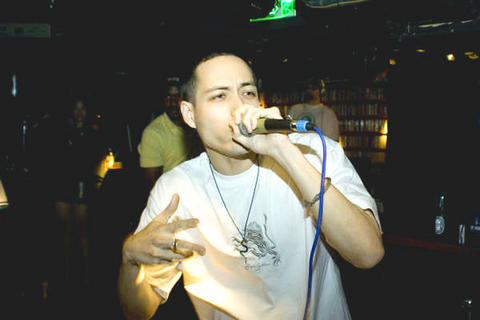His clean-cut GQ looks and well-mannered deportment may not shout hip-hop, but once he starts spitting out rhymes, it's clear that this charming rapper is the real deal. MC Shaman (玄武), aka Elliot Tsai, first drew attention with his mellow Chinese rap song Man Man Lai (慢慢來, Take It Easy) on MySpace Music. It's a soothing song for those stressed-out about life.
Shaman brings his laptop to an interview with the Vinyl Word to present more of his recent work: Two party-rocking songs Blow Ya Mindz and Countdown to Unsound that he did with Vast (Canadian DJ, sound engineer) and BabbleOn (Canadian MC, B-boy) as well as with his group THC (Taipei Hip-hop Crew). After listening to the music as Shaman raps along in sync, I can't wait to see his next gig.
Having been in the hip-hop game for about five years, Shaman recalls that it was a Taiwanese gansta rapper he met during his one-year stay in Washington, DC who drew him into the scene. "Just hanging out with him, I picked up the ability to rap," he said. "One day in 2003, a song just popped into my head and ever since then I have had no problem writing songs."

PHOTO COURTESY OF DAVID P. HEDLUND.
In 2003, Shaman - influenced by Tupac, Method Man, Eminem, Snoop, UGK, 50 Cent and even classical music - went to Houston, Texas, and began emceeing at parties, open mic gigs and on the radio.
"I have two kinds of songs," he says. "One is party music, but in the other kind I talk about saving the world, being humble and taking care of nature."
I don't really care much about cars, money, or bling ... when I hear songs about that stuff I start to fall asleep. My music is about freedom."
Shaman grew up in Houston and was raised by a NASA scientist father from Taiwan (also a blues/jazz fan, former actor and former mobile DJ) and an American hippie mother. This background, along with his interest in drawing, poetry, super-hero comic books, spiritual stuff and music have helped get him where he is.
MC Shaman has the ability to ease people's minds with his songs, like a medicine man. As he says, "Ultimately, I want my music to be medicine for the soul. I want to heal the world. Music has the power to make people think, to inform them, to make them feel passion, to inspire ... . Music is magic. That's why I'm the Shaman."
THC's music "is special," he says, "because it has English, French and Chinese ... with cultural influences from the US and Canada. Our music is very mixed ... but still true hip-hop."
The group is planning to release an album this year.
It seems like the advertising major knows his niche and the way to reach audiences. THC appeared at a handful of shows and festivals (Peace Fest and Basic Aid) last year, and has already garnered a dedicated following (which consists of mostly foreigners and Taiwanese girls) in and around Taipei. "We'd also like to see more Taiwanese people coming to our shows and maybe work with some other local artists in the future," he adds.
For more info about MC Shaman and THC visit myspace.com/thedragonshaman.
Upcoming gigs by THC: Feb. 16 at Elemental, a hip-hop party in Taichung and Feb. 29 at Bliss, located at 148, Xinyi Rd Sec 4, Taipei City (台北市信義路四段148號). Entry for the show at Bliss is NT$200.

The Democratic Progressive Party (DPP), Chinese Nationalist Party (KMT), and the country’s other political groups dare not offend religious groups, says Chen Lih-ming (陳立民), founder of the Taiwan Anti-Religion Alliance (台灣反宗教者聯盟). “It’s the same in other democracies, of course, but because political struggles in Taiwan are extraordinarily fierce, you’ll see candidates visiting several temples each day ahead of elections. That adds impetus to religion here,” says the retired college lecturer. In Japan’s most recent election, the Liberal Democratic Party lost many votes because of its ties to the Unification Church (“the Moonies”). Chen contrasts the progress made by anti-religion movements in

Taiwan doesn’t have a lot of railways, but its network has plenty of history. The government-owned entity that last year became the Taiwan Railway Corp (TRC) has been operating trains since 1891. During the 1895-1945 period of Japanese rule, the colonial government made huge investments in rail infrastructure. The northern port city of Keelung was connected to Kaohsiung in the south. New lines appeared in Pingtung, Yilan and the Hualien-Taitung region. Railway enthusiasts exploring Taiwan will find plenty to amuse themselves. Taipei will soon gain its second rail-themed museum. Elsewhere there’s a number of endearing branch lines and rolling-stock collections, some

This was not supposed to be an election year. The local media is billing it as the “2025 great recall era” (2025大罷免時代) or the “2025 great recall wave” (2025大罷免潮), with many now just shortening it to “great recall.” As of this writing the number of campaigns that have submitted the requisite one percent of eligible voters signatures in legislative districts is 51 — 35 targeting Chinese Nationalist Party (KMT) caucus lawmakers and 16 targeting Democratic Progressive Party (DPP) lawmakers. The pan-green side has more as they started earlier. Many recall campaigns are billing themselves as “Winter Bluebirds” after the “Bluebird Action”

Last week the State Department made several small changes to its Web information on Taiwan. First, it removed a statement saying that the US “does not support Taiwan independence.” The current statement now reads: “We oppose any unilateral changes to the status quo from either side. We expect cross-strait differences to be resolved by peaceful means, free from coercion, in a manner acceptable to the people on both sides of the Strait.” In 2022 the administration of Joe Biden also removed that verbiage, but after a month of pressure from the People’s Republic of China (PRC), reinstated it. The American